18 Hours of Chaos and Uncertainty
Lisa Desjardins, a PBS NewsHour Capitol Hill correspondent, was working inside the Capitol on January 6. Little did she know, she'd soon be face-to-face with the pro-Trump mob.
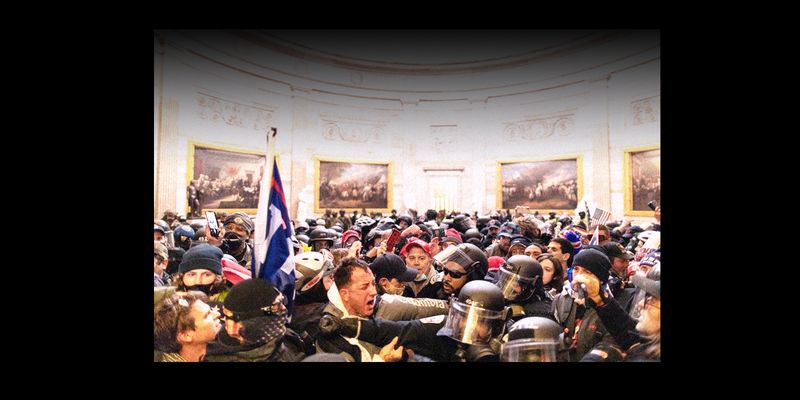

On January 6, 2021, a pro-Trump mob breached the U.S. Capitol in Washington, D.C., temporarily halting the Electoral College certification of the 2020 election. The rioters, some of whom carried Confederate flags, shouted that the election was "stolen" and "rigged" as they smashed windows and ransacked congressional offices. During this time, members of Congress were sheltered in place, and later evacuated from the building. PBS NewsHour Capitol Hill correspondent Lisa Desjardins found herself in the middle of it all, reporting on the chaos in real time with nothing but herself and her phone. Here, in her own words, Desjardins takes Marie Claire inside the 18-hour day that saw five deaths and, ultimately, the confirmation of Joe Biden's victory.
10:00 A.M.
I knew I was going to be inside the Capitol that day. I cover Congress, so I planned to cover the Electoral College count. When I found out there would be a pro-Trump rally, I didn't think I would be talking to protestors much at all. My colleague, Amna Nawaz, was covering the protestors outside and she was the one I was really concerned for. If there were going to be any problems, I felt safe inside. I put on a cute outfit—I wore windowpane pants that were kind of preppy—and made my way to the Capitol.
Still, I did think in the back of my mind, What if things get ugly? I packed an extra outfit that was not quite so business-y (a navy blue turtleneck and navy blue leggings) just in case—one that wouldn't make me look like a member of Congress or a reporter and would help me fit in with a protest crowd.
1:29 P.M.
I had been live on air for our special coverage of the joint session of Congress when a producer texted confirming that the Cannon Office Building had been breached. That's when I changed into the other outfit.
My office is on the third floor of the Capitol. Office is too generous of a term—it's really like a tiny telephone booth that PBS reporters can use. You can fit a laptop and two chairs in there, essentially. It's on the same level as the balconies of the House chamber. It's a very short walk from there to the middle of the Capitol, which is where the rioters broke down the front door. The way I run, it's less than a minute between those two locations.
The escalation happened very fast. When I heard they were locking down the Cannon building, I went there to check it out and I couldn't get in. I asked around. I could tell that tension was rising, but it still didn't seem like there were any significant threats. I walked back to the Capitol and I had a conversation with some police officers I know outside of the House chamber. They didn't even really know about the lockdown at the other buildings. They seemed like, Oh, we're fine. Nobody told us anything. Everything's fine. I almost felt like I was being dramatic talking to them.
2:13 P.M.
Shortly after that conversation, I walked to the front door of the Capitol—I was there with about four other people: two or three reporters (the number changed as I was there) and two Capitol staffers who work for the U.S. Capitol Guide Service—and I watched as the protestors started banging at the door, using what looked like a very large hammer and the butt end of an American flag pole, crashing through. That's when I said to myself, Wow, this could get really ugly and I said to our staff at NewsHour, Get me on the phone, like, right now. Let's put me on [on-air] now.
Stay In The Know
Get exclusive access to fashion and beauty trends, hot-off-the-press celebrity news, and more.
My editors were all texting me, asking me to get to my camera because they were seeing the mob move outside. "What’s the eta for Lisa?" my boss Sara Just, executive producer, texted at 2:16 p.m. Then three more texts that same minute: "Lisa - your eta?" from senior politics producer Beth Summers. I texted back asking them to see my Twitter feed and sent video of what I was seeing. "Lisa we need you in position" and "Or on phone maybe," from Sara. I texted back, "Let’s do phone much better" and "Call me" at 2:17 p.m. They quickly texted me a number for our control room. I called and was patched through to the show with our anchor, Judy Woodruff.
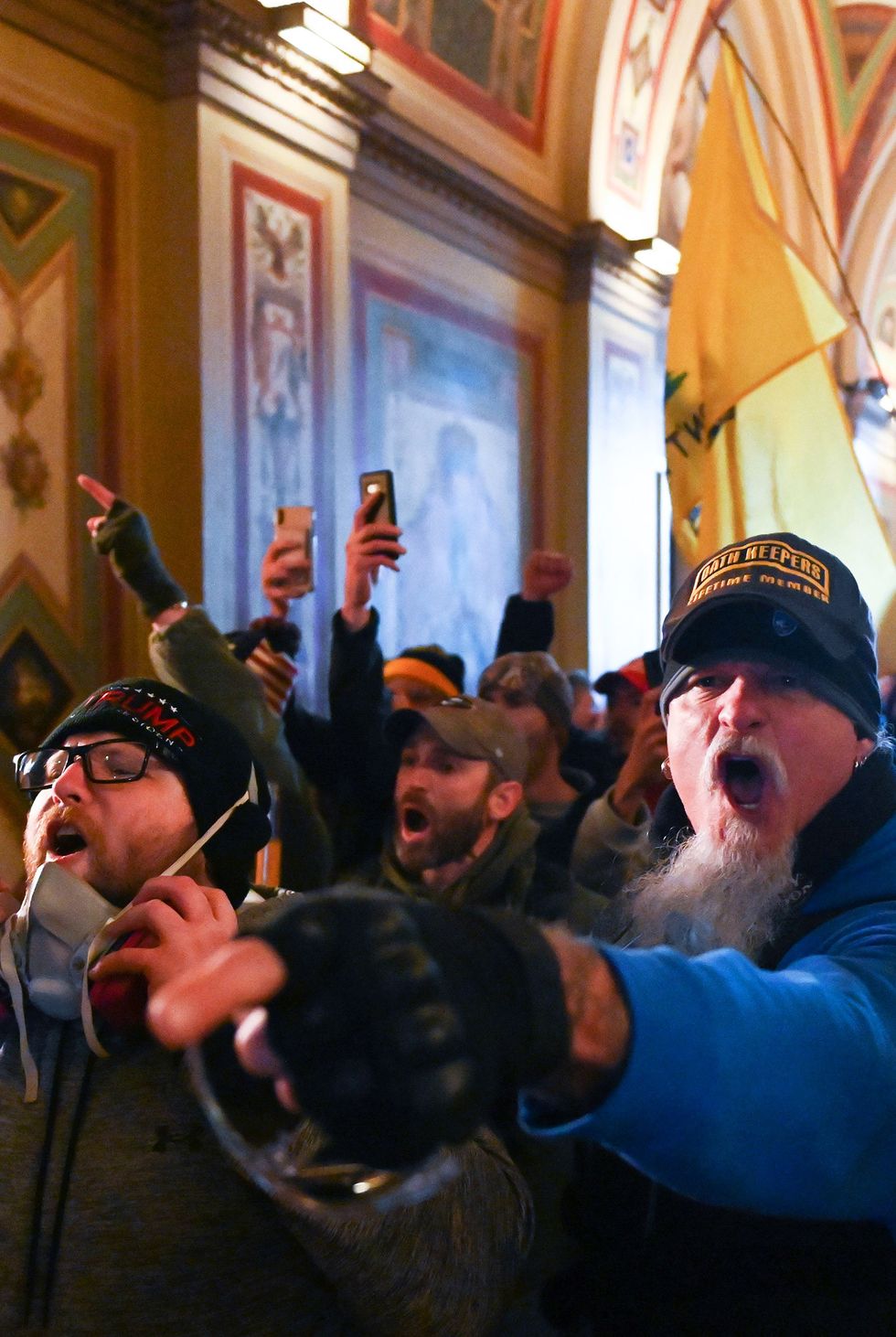
A pro-Trump mob storms the U.S. Capitol on January 6, 2021.
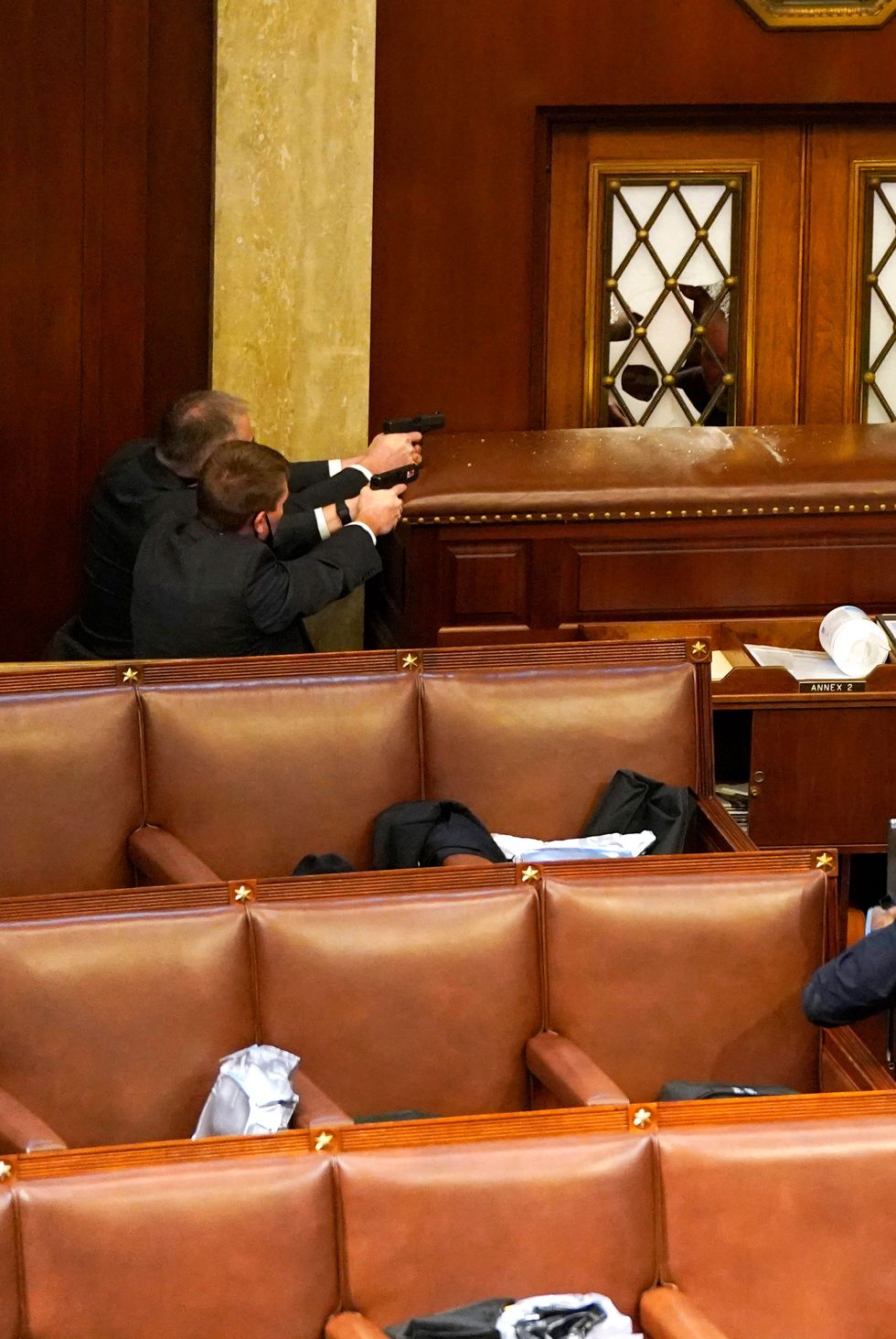
Security barricades the door of the House chamber.
At this point, I only had one phone with me (a spare was back in my office). I knew that the rioters were coming toward me. I looked at my phone and it looked back at me and it said two percent. And I was like, Oh, you gotta be kidding me. I had a battery pack, but I used that up within an hour.
I'm reporting in real time, over the phone, what I'm seeing, and I did an interview with some of the rioters. I saw them going into the offices themselves and starting to think about going into the chamber. There were more and more of them. I saw rioters at at least three points. I saw maybe eight to 12 go through the narrow opening they’d made in the front door. Two of those came upstairs and I interviewed them. I later saw them rummaging through a cabinet across from a police post.
WATCH: "Protesters have now broken into the U.S. Capitol."@LisaDNews reports from inside the Capitol as protesters entered the building. pic.twitter.com/cRULIZk47HJanuary 6, 2021
2:30 P.M.
I had to go get my other phone. A few minutes later, once I returned to that hallway and took my position inside that police desk/post area, I saw maybe 20 or 30 rioters coming and going on the third floor. They were starting to get a little bit more confrontational, but I still felt okay. There was a desk between me and the rioters. Then I heard the police arrive and they forced the rioters on the ground with their hands behind their heads. Meanwhile, I'm still crouching down behind this desk. I think I said, "I'm with the media." I had my hands up while I was reporting.
During this time, I could see that there was a very long line of members of Congress running from somewhere near the House chamber. The rioters had been secured on the ground, so the members of Congress were being evacuated. I'm not quite sure where [the members of Congress] had been, but they were running across the hall and down the stairs. They had plastic bags over their heads. It was the strangest sight. There was so much that I was taking in at that moment. I thought, What are those? Why do they have plastic bags over their head? Those were the gas masks that they have at the Capitol. It was unsettling; like a hostage image. I saw the chairman of the Homeland Security committee go by, all of these members of Congress who I know were just running down the stairs with police like, go, go, go, go, go, go, go, go. It was this unending line, so long that I almost had trouble folding into it.
Desjardins captures footage of rioters chanting outside the door of the U.S. Capitol building before storming inside.
Before the evacuation, I had already been in three different places with rioters and there had been no pushback from police. I could hear a very large group of rioters yelling on the floor below me and they were just walking at will in spaces that reporters are not even allowed to go to. The yelling I heard below was likely from the House chamber and the hallways around it. But it also sounded like it could have been from Statuary Hall. It seemed like it was going on a long time. There was a moment where I thought, Okay, if the police don't ever come, what am I going to say to protesters to get myself out of this building? How am I gonna get them to relate to me so that they help me get out? Because I was like, The only people who might help me get out are the rioters because I don't know when police are coming, but then the police did come. And I think at that point, their main mission was to get the members of Congress out [of the building].
In a way, luckily for me, I was in the same place as some members of Congress and it turned out not far away from where the rest of the members of Congress were sheltering. The police secured that corner of a hallway that had all these rioters and put them on the ground. It was like what you see on an episode of Cops. They were yelling, they had their guns drawn, the light of the scope of the gun was pointing at me like a laser, and pointing at [the rioters].
In that moment I was like, Oh, I need to make sure that police know that I'm not a threat to them. So then my whole calculation changed in a second. Luckily, I've worked with Capitol police a lot. I had on my mask, which says PBS NewsHour on it, that I wore on purpose to identify myself. So that was the first moment that I was like, Okay, the police are here and now I'm going to get out of this situation.
I didn't end up leaving the Capitol the whole day. I didn't even know until midnight that I could leave the Capitol. After they evacuated us from the main building, I went to the Longworth Office Building for I don't know how many hours, just sitting in the window wells of empty hallways. I didn't have my wallet or my car keys, so I didn't have any money to get anything from a vending machine. I didn't have any water. There was a point when I thought, Am I gonna be here until tomorrow morning? Am I going to get really thirsty at some point?
4:55 P.M.
My next mission was to find someone I knew who I could beg for a charger. I couldn't find anyone. I was texting people, "Hey, are you around?" Nobody. Then I finally run into Rep. Mark DeSaulnier of California. It was just me in this huge hallway with him and two of his staffers. All of the buildings, including the one I was in, was in lockdown; everyone was sheltering in place. I know him, he watches our show, and I didn't want to put any pressure, but I made this offhand remark like, I can't believe I had my charger cord and didn't bring the connector. I was basically like, please help me. Then one of his staffers pulls out of her bag the exact thing that I need. That honestly might've been the only moment that I almost cried.
7:30 P.M.
Police finally escorted me, a few reporters, and staff of the House Radio TV Gallery back into the Capitol around 7:30 or 8 p.m. But at that point, we still couldn't leave the building. I gulped down some water, then I quickly ate the lunch I'd brought. I was really unhappy that I brought a very healthy lunch—hummus and carrots. I was like, why didn't I bring a hamburger? But at that point, I also just really wanted to get back to covering the election. I felt it was clear that the rioters wanted to stop the election and they wanted to stop Congress from certifying it. As a reporter, I really wanted to cover Congress finishing their job and finishing the election.
4:00 A.M.
The minute we knew that Congress was coming back that night was a good moment for me. I knew that I would stay through the end.
Before the riots, I was not planning to stay until 4:00 a.m. I would have gone home at some point during the debates and just watched it on C-SPAN. But because that day was so intense, and because it felt important as a statement that the work be done, and because I wanted to cover it for that reason, I stayed until four. It was as strange as you might think it was.
I feel like what I witnessed was a real manifestation of a large part of America not wanting to believe reality and also feeling entitled to unleash their anger however they want. As a reporter, I cover a lot of anger, and as a mom, I know anger is important. We feel angry for reasons. I understand a big part of why Trump supporters might feel angry. But I think that what I saw at the Capitol made it clear to me that there is a group in America that is giving themselves permission to turn anger into hate and hate into violence. From talking with the rioters, I think Americans need to realize that anger is running deep with this group right now. We need to find a way, as a society, to firmly say this is unacceptable, but at the same time be able to have conversations with people who aren't like us. And that's tricky to do. I don't have answers. That's why I'm not a lawmaker. I think the challenge here is even larger than people understand.
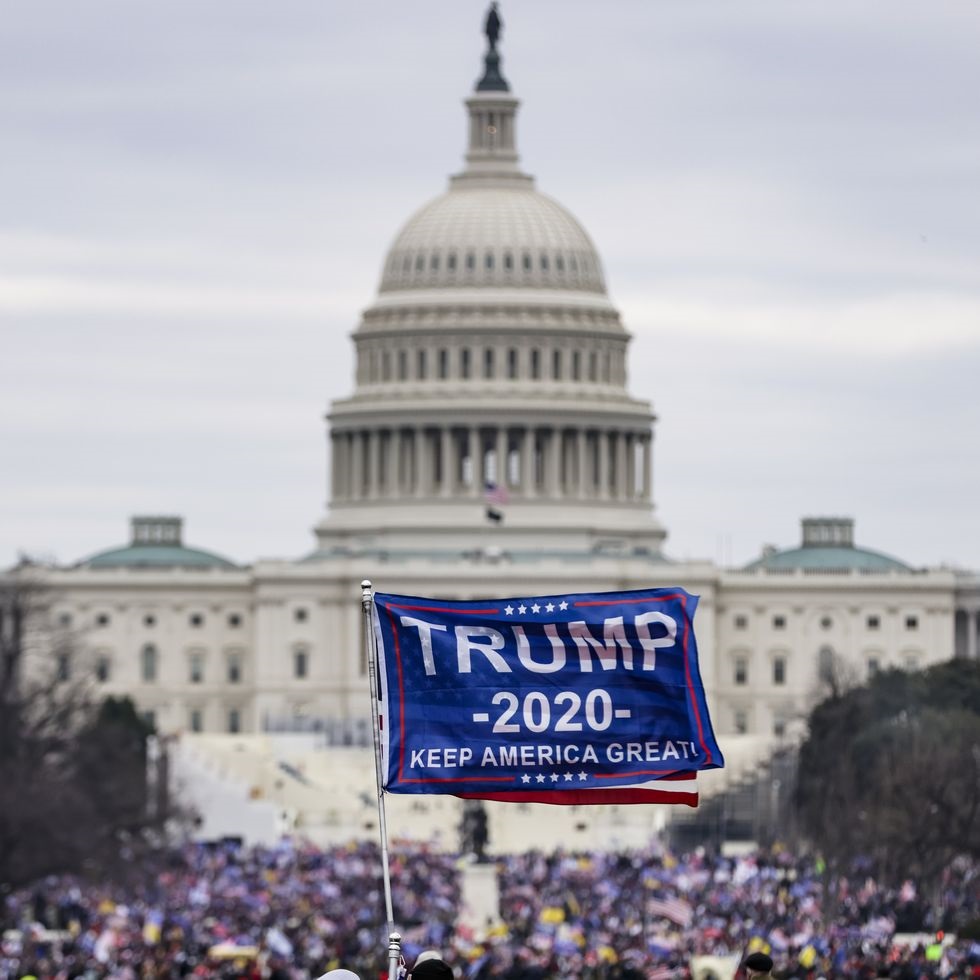
I'm generally an optimist and I still am optimistic about our constitution. I'm someone who loves the Capitol building, and I'm optimistic about them figuring out the security problems they have. But it does give me pause because I think there's something deeply wrong that is a part of the psychology of this country right now.
This piece has been updated.
RELATED STORY
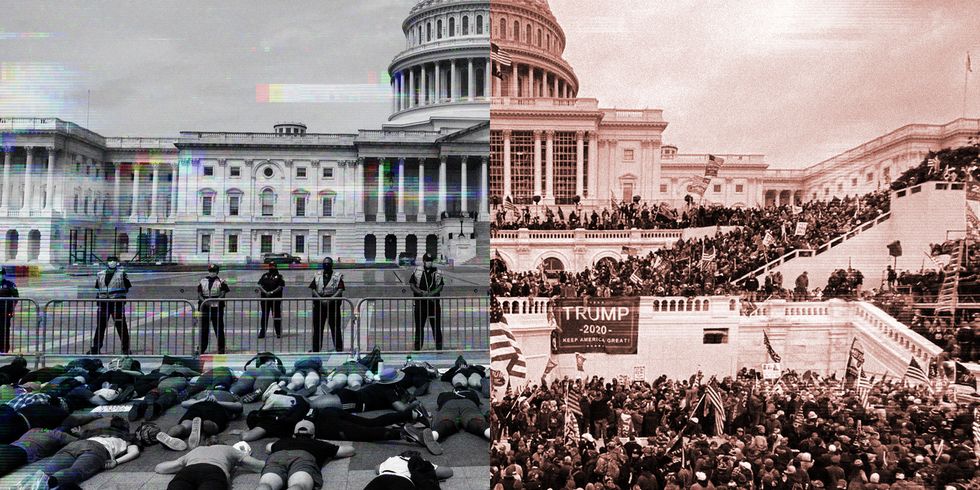
Rachel Epstein is a writer, editor, and content strategist based in New York City. Most recently, she was the Managing Editor at Coveteur, where she oversaw the site’s day-to-day editorial operations. Previously, she was an editor at Marie Claire, where she wrote and edited culture, politics, and lifestyle stories ranging from op-eds to profiles to ambitious packages. She also launched and managed the site’s virtual book club, #ReadWithMC. Offline, she’s likely watching a Heat game or finding a new coffee shop.
-
 Meet Isabela Merced, Who Plays Dina in 'The Last of Us' and Calls Her and Ellie's Romance a "Successful Sapphic Story"
Meet Isabela Merced, Who Plays Dina in 'The Last of Us' and Calls Her and Ellie's Romance a "Successful Sapphic Story"We're already obsessed with this up-and-comer.
By Quinci LeGardye Published
-
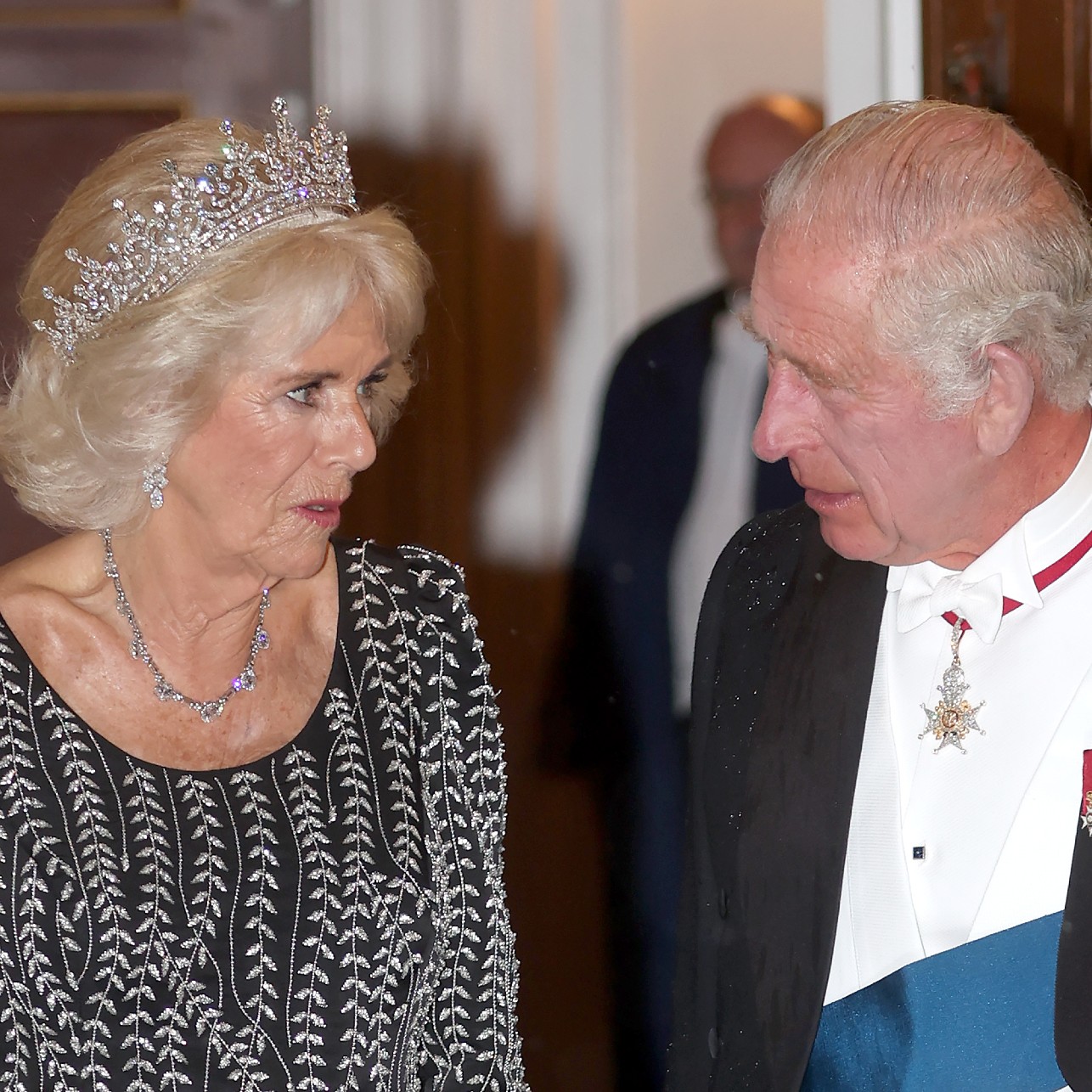 Queen Camilla Uses a "Signal" from Queen Elizabeth's Playbook to Get King Charles to Stop Talking
Queen Camilla Uses a "Signal" from Queen Elizabeth's Playbook to Get King Charles to Stop TalkingRoyal author Robert Hardman said "tours don't go nearly as well" when Queen Camilla isn't "around."
By Kristin Contino Published
-
 Beyoncé Cashes In on Coachella's Micro Shorts Trend
Beyoncé Cashes In on Coachella's Micro Shorts TrendShe's back in her Levi's bag.
By Kelsey Stiegman Published
-
 36 Ways Women Still Aren't Equal to Men
36 Ways Women Still Aren't Equal to MenFeatures It's just one of the many ways women still aren't equal to men.
By Brooke Knappenberger Last updated
-
 How New York's First Female Governor Plans to Fight for Women If Reelected
How New York's First Female Governor Plans to Fight for Women If ReelectedKathy Hochul twice came to power because men resigned amid sexual harassment scandals. Here, how she's leading differently.
By Emily Tisch Sussman Last updated
-
 Why the 2022 Midterm Elections Are So Critical
Why the 2022 Midterm Elections Are So CriticalAs we blaze through a highly charged midterm election season, Swing Left Executive Director Yasmin Radjy highlights rising stars who are fighting for women’s rights.
By Tanya Benedicto Klich Published
-
 Tammy Duckworth: 'I’m Mad as Hell' About the Lack of Federal Action on Gun Safety
Tammy Duckworth: 'I’m Mad as Hell' About the Lack of Federal Action on Gun SafetyThe Illinois Senator won't let the memory of the Highland Park shooting just fade away.
By Sen. Tammy Duckworth Published
-
 Roe Is Gone. We Have to Keep Fighting.
Roe Is Gone. We Have to Keep Fighting.How To Democracy always offers a path forward even when we feel thrust into the past.
By Beth Silvers and Sarah Stewart Holland, hosts of Pantsuit Politics Podcast Published
-
 The Supreme Court's Mississippi Abortion Rights Case: What to Know
The Supreme Court's Mississippi Abortion Rights Case: What to KnowThe case could threaten Roe v. Wade.
By Megan DiTrolio Published
-
 Sex Trafficking Victims Are Being Punished. A New Law Could Change That.
Sex Trafficking Victims Are Being Punished. A New Law Could Change That.Victims of sexual abuse are quietly criminalized. Sara's Law protects kids that fight back.
By Dr. Devin J. Buckley and Erin Regan Published
-
 My Family and I Live in Navajo Nation. We Don't Have Access to Clean Running Water
My Family and I Live in Navajo Nation. We Don't Have Access to Clean Running Water"They say that the United States is one of the wealthiest countries in the world. Why are citizens still living with no access to clean water?"
By Amanda L. As Told To Rachel Epstein Published